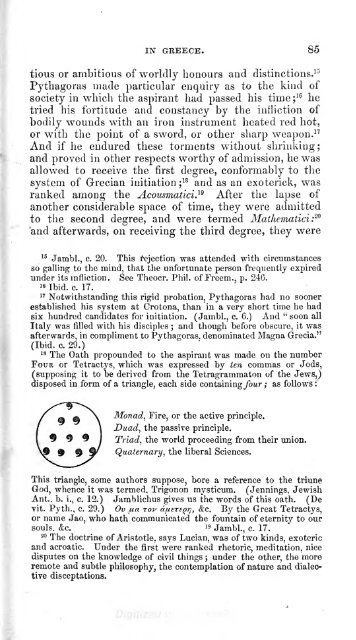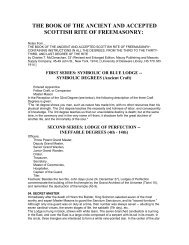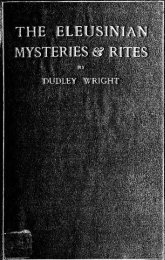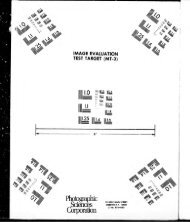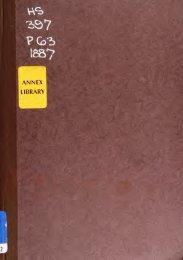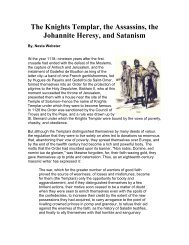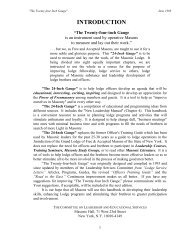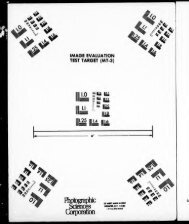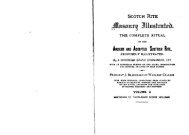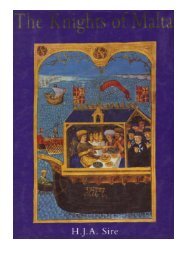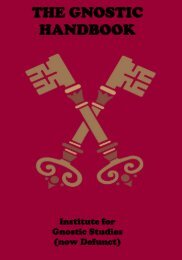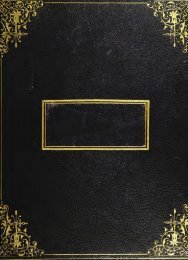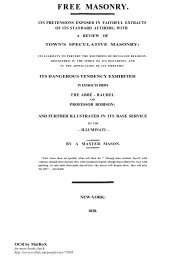The History of Initiation - The Masonic Trowel
The History of Initiation - The Masonic Trowel
The History of Initiation - The Masonic Trowel
Create successful ePaper yourself
Turn your PDF publications into a flip-book with our unique Google optimized e-Paper software.
IN GREECE. 85<br />
tious or ambitious <strong>of</strong> worldly honours and distinctions. 15<br />
Pythagoras made particular enquiry<br />
as to the kind <strong>of</strong><br />
society in which the aspirant had passed his time 1G he<br />
;<br />
tried his fortitude and constancy by the infliction <strong>of</strong><br />
bodily wounds with an iron instrument heated red hot,<br />
or with the point <strong>of</strong> a sword, or other sharp weapon. 17<br />
And if he endured these torments without shrinking;<br />
and proved in other respects worthy <strong>of</strong> admission, he was<br />
allowed to receive the first degree, conformably to the<br />
system <strong>of</strong> Grecian initiation 18<br />
; and as an exoterick, was<br />
the lg<br />
Acousmatici.<br />
ranked among After the lapse <strong>of</strong><br />
another considerable space <strong>of</strong> time, they were admitted<br />
to the second degree, and were termed Mathematici : 20<br />
"and afterwards, on receiving the third degree, they were<br />
15<br />
Jambl., c. 20. This Rejection was attended with circumstances<br />
so galling to the mind, that the unfortunate person frequently expired<br />
under its infliction.<br />
16 Ibid. c. 17.<br />
See <strong>The</strong>ocr. Phil, <strong>of</strong> Freem., p. 246.<br />
17<br />
Notwithstanding this rigid probation, Pythagoras had no sooner<br />
established his system at Crotona, than in a very short time he had<br />
six hundred candidates for initiation.<br />
( Jarnbl., c. 6.) And " soon all<br />
Italy was filled with his disciples and ; though before obscure, it was<br />
afterwards, in compliment to Pythagoras, denominated Magna Grecia."<br />
(Ibid. c. 29.)<br />
18 <strong>The</strong> Oath propounded to the aspirant was made on the number<br />
FOUR or Tetractys, which was expressed by ten commas or Jods,<br />
(supposing it to be derived from the Tetragrammaton <strong>of</strong> the Jews,)<br />
disposed in form <strong>of</strong> a triangle, each side con taming four ; as follows:'<br />
Monad, Fire, or the active principle.<br />
Duad, the passive principle.<br />
Triad, the world proceeding from their union.<br />
Quaternary, the liberal Sciences.<br />
This triangle, some authors suppose, bore a reference to the triune<br />
God, whence it was termed, Trigonon mysticum. (Jennings, Jewish<br />
Ant., b. i., c. 12.) Jamblichus gives us the words <strong>of</strong> this oath. (De<br />
vit. Pyth., c. 29.) Ov pa TOV d/nere^rj, &c. By the Great Tetractys,<br />
or name Jao, who hath communicated the fountain <strong>of</strong> eternity to our<br />
19<br />
souls, &c.<br />
Jambl., c. 17.<br />
20 <strong>The</strong> doctrine <strong>of</strong> Aristotle, says Lucian. was <strong>of</strong> two kinds, exoteric<br />
and acroatic. Under the first were ranked rhetoric, meditation, nice<br />
disputes on the knowledge <strong>of</strong> civil things ; under the other, the more<br />
remote and subtle<br />
philosophy, the contemplation <strong>of</strong> nature and dialective<br />
disceptations.


